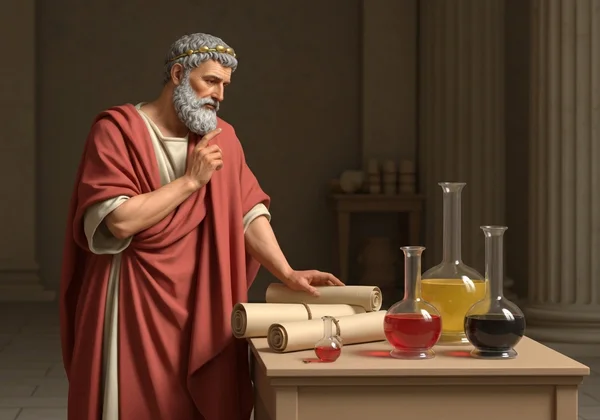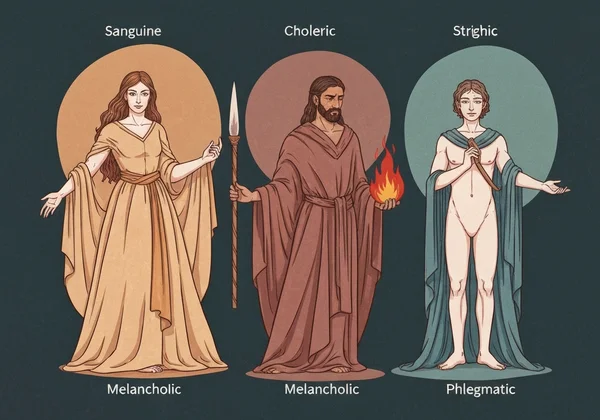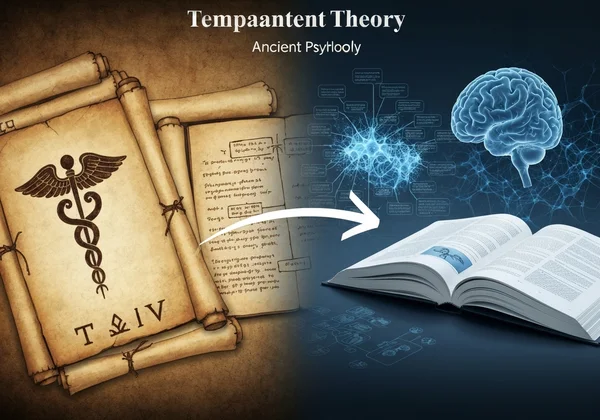History of the Temperament Test: From Ancient Greece to Modern AI Insights
October 11, 2025 | By Arthur Bowman
The human quest for self-understanding is as old as civilization itself. We have always looked for frameworks to make sense of our behaviors, emotions, and interactions. Among the earliest and most enduring of these is the theory of the four temperaments. But how did this ancient concept evolve from philosophical musings into a modern psychological tool? This article traces the fascinating journey of the temperament test, from its origins with Hippocrates to its powerful application in today’s sophisticated, AI-driven online assessments. Join us as we explore this rich history and discover how ancient wisdom continues to provide profound insights into who we are.
The Ancient Roots: Hippocrates and the Four Humors
Our story begins in ancient Greece, around 400 BC, with the physician Hippocrates, often called the "Father of Medicine." He proposed that the human body contained four essential fluids, or "humors," and that a person's health and disposition were determined by the balance of these fluids. This concept, known as humoral theory, was one of the first attempts to connect our physical bodies with our psychological states. It laid the groundwork for a systematic approach to understanding human nature, moving beyond superstition and towards a more observational model.
Understanding the Humoral Theory and Early Personality
The four humors identified by Hippocrates were blood, yellow bile, black bile, and phlegm. Each was associated with a specific organ and a fundamental element (air, fire, earth, and water, respectively). According to this early theory, a healthy individual had these humors in perfect equilibrium. However, if one humor became dominant, it was believed to influence not only a person's physical health but also their core emotional and behavioral tendencies—their innate disposition. This revolutionary idea suggested that our moods and actions weren't just random but were tied to our underlying biology.

Associating Humors with Temperaments: Early Classifications
The direct link between the four humors and specific temperaments was later solidified by the Greek philosopher and physician Galen. He developed a typology that has resonated through the centuries, creating archetypes that are still recognizable today. The dominance of a particular humor was said to produce a distinct temperament:
- Blood (Sanguis): An excess of blood was thought to create the Sanguine temperament, characterized by enthusiasm, sociability, and optimism.
- Yellow Bile (Chole): A surplus of yellow bile resulted in the Choleric temperament—ambitious, decisive, and often quick to anger.
- Black Bile (Melas Chole): Dominant black bile led to the Melancholic temperament, known for being analytical, thoughtful, and prone to sadness.
- Phlegm (Phlegma): An abundance of phlegm produced the Phlegmatic temperament, described as calm, reliable, and peaceful.
These classifications were the first comprehensive attempt to categorize human behavioral patterns. To see how these ancient types apply to you, you can discover your temperament on our platform.

Evolution Through the Ages: From Galen to Modern Interpretations
While the biological basis of humoral theory has long been disproven, the psychological archetypes it produced proved remarkably resilient. The framework behind the temperament test did not fade into obscurity; instead, it evolved, adapting to new cultural and scientific contexts over millennia. Its journey from an ancient medical theory to a tool of modern psychology is a testament to its intuitive power.
Galen's Contributions: Refining and Solidifying Temperament Theory
Galen of Pergamon, a prominent Roman physician in the 2nd century AD, was instrumental in popularizing and expanding upon Hippocrates' work. He was the one who systematically linked the four humors to the four temperaments, creating the comprehensive system we recognize today. Galen's writings were incredibly influential, and his typology became the standard for understanding personality in the Western world for over 1,500 years, shaping medical practice and philosophical thought well into the Renaissance.
Medieval and Renaissance Revivals of Temperamental Thought
Throughout the Middle Ages and the Renaissance, the four temperaments remained a central concept for understanding human nature. They were integrated into art, literature, and philosophy. From Chaucer's characters in The Canterbury Tales to Shakespeare's complex heroes, these temperamental types were used to create relatable and psychologically rich figures. This cultural integration kept the ideas alive, ensuring they were passed down through generations not just as a medical theory but as a practical tool for understanding people.
Temperament in the Dawn of Modern Psychology
As science advanced, the focus shifted from bodily fluids to psychological processes. Philosophers like Immanuel Kant and later psychologists like Alfred Adler and Carl Jung revisited the classical temperaments. They stripped away the outdated biology of the four humors but recognized the value of the underlying behavioral categories. They reinterpreted the temperaments as dimensions of innate disposition, such as emotional reactivity and energy levels. This transition marked a crucial step in transforming the ancient theory into a concept compatible with the modern temperament test. You can see the culmination of this evolution when you take the test and receive your analysis.

Temperament Today: Science, Psychology, and AI-Driven Insights
In the 21st century, the four temperaments have found a new and powerful application. While we no longer attribute our moods to bodily fluids, contemporary psychology widely accepts that we are born with certain innate behavioral tendencies. This foundational aspect of our being is what we now call temperament. Today, taking an online temperament test offers profound self-understanding by refining our ability to measure these innate tendencies, leading to deeper self-awareness and personal growth.
What's the Difference Between Temperament and Personality?
This is a common and important question. In modern psychology, temperament is considered the innate, genetically influenced foundation of your personality. It's the "how" of your behavior—your natural energy level, emotional intensity, and responsiveness. Personality, on the other hand, is a much broader concept. It is the complex and unique structure that is built upon your temperament through life experiences, culture, relationships, and conscious choices. Understanding your core temperament provides the crucial first layer of insight into why you are the way you are. Exploring this foundation is simple with our AI-enhanced temperament test.
The Role of Scientific Research and AI in Modern Temperament Analysis
Today, the value of temperament theory is amplified by scientific validation and technological innovation. Researchers have identified biological correlates for traits like extraversion and emotional reactivity, confirming the ancient idea that our dispositions have a physical basis. This is where modern online temperament tests come in. By combining the timeless wisdom of the four temperaments with the power of artificial intelligence, our online temperament test can offer an analysis that is both deeply rooted in history and incredibly precise. Our AI-driven algorithm analyzes your responses to provide a nuanced profile that goes beyond a simple label, offering personalized insights into your strengths, challenges, and opportunities for growth. This modern approach allows you to get personalized insights that are tailored specifically to you.

Embrace Ancient Wisdom with Modern Insight: Your Temperament Journey
The journey of the four temperaments is a remarkable story of an idea's endurance. From its ancient origins as a medical theory of humors to its modern interpretation as a cornerstone of psychological self-discovery, it has consistently helped people make sense of themselves and others. The modern temperament test has survived because it speaks to a fundamental truth: we each have a unique, inborn nature that shapes our path in life.
By understanding your temperament, you gain a powerful tool for navigating relationships, choosing a fulfilling career, and managing stress. You learn to work with your nature, not against it. The history of this theory has led to this moment, where you can access this profound knowledge easily and accurately. Start your journey of self-discovery today. Take the temperament test and connect with a tradition of wisdom that is thousands of years in the making.
Frequently Asked Questions About Temperament Theory
What are the core types in temperament theory?
The four core temperament types, originating from ancient Greek theory, are Sanguine, Choleric, Melancholic, and Phlegmatic. Sanguine individuals are typically sociable and optimistic. Choleric types are ambitious and decisive. Melancholic individuals are analytical and thoughtful. Phlegmatic types are calm and steady. Most people are a blend of these, but one or two usually stand out as dominant. You can find your type with a quick assessment.
Is the four temperaments model still accurate and relevant today?
Absolutely. While the original explanation involving bodily fluids is obsolete, the four temperaments remain a highly relevant and practical framework for understanding innate behavioral tendencies. Modern psychology has validated the existence of these core dispositional traits. When a temperament test is used as a tool for self-reflection rather than a rigid set of labels, it provides valuable insights into personal strengths and areas for growth. Using a modern temperament test ensures the interpretation is up-to-date and useful.
How does temperament differ from personality in psychological terms?
Temperament is considered the biological, inborn foundation of personality. It refers to your natural tendencies regarding mood, activity level, and emotional reactivity—the "how" of your behavior. Personality is a broader, more complex structure that develops over time. It is shaped by your temperament plus your experiences, education, relationships, and culture. Think of temperament as the raw clay and personality as the finished sculpture. You can explore our temperament test to understand your foundational temperament.